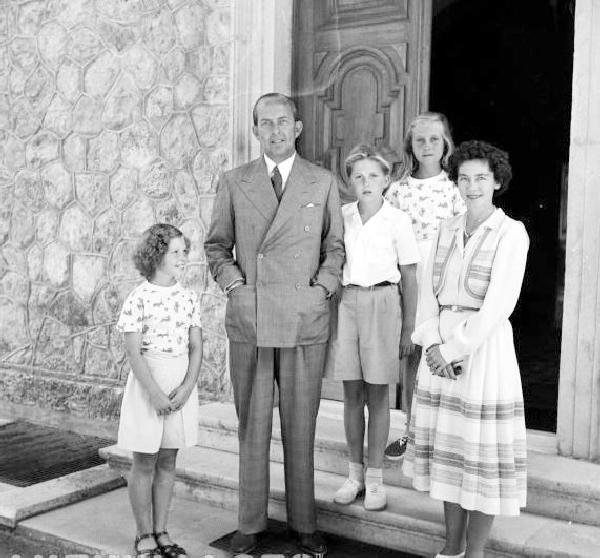
Figure 1.--Here is King Paul of Greece and Queen Frederika with their three children Princess Sophia, Prince Constantine, and Princess Irene. The photograph was probably taken about 1950. |


|
Prince Paul was the third son of King Constantine. He was born in Atlens during 1901. His mother was Princess Sophia of Germany. He trained to be a naval officer. He married Princess Frederika of Hannover (1938). He with the rest of the royal family fled Greece with the British after the Germans invaded the country (1941). He succeed his brother as king in 1947. Greece acquired the Dodecanese Islands under a 1947 peace treaty with Italy. Communist-led rebels revolted against the governement at the end of 1946. Great Britain supported the government by giving Greece exonomic support and military aid against the rebels, but could not longer afford to continue doing so. Under the Truman Doctrine, announced in March 1947, the United States took over the British support of Greece. A long, bitter civil war followed. The Communists were finally defeated by October 1949, after the United States provided the Government with massive military aid. George Papandreou of the Center Union party became prime minister of Greece in November 1963. Earlier, he had charged that the elections of 1961 were rigged and suggested that the army, with support from the monarchy, stood in the way of democracy. King Paul died in 1964.
Prince Paul was the third son of King Constantine. He was born in Atlens during 1901. His mother was Princess Sophia of Germany.
Prince Paul trained to be a naval officer.
Frederika was born in Blankenburg, Germany, a princess of Hannover (1917). Her father was Ernest Augustus III, Duke of Brunswick and Princess Victoria of Prussia. Princess Victoria was Kaiser Wilhelm II's daughter. Thus through her mother she was related to both the German and British royal family. We do not know much about her childhood. We do know that she joined the Bund Deutscher Mädel (BDM)--the girls' division of the Hitler Youth. We do not know why she joined. In the early period of NAZI rule, membership was still voluntary. We do not know when she met Prince Paul. We do know that Prince Paul asked her to marry him whikle he was in Berlin attending the Summer Olympic Games (1936). They announced their engagement (1937) and were married in Athens (1938). They lived at Villa Psychiko in the Athens suburbs. Princess Sophia was born (1938) and
and Prince Constantine (1940). Soon their quiet family life was interupted by international events. Mussolini who had seized Albania, invaded Greece (October 1940). Here husband became King Paul I after the War (1947). Queen Frederika was a beautiful and highly intelligent woman. She did not prove to be an asset to her husband as king after the War. There were several problems. First it was primarily her Germaness in a country that fought Germany in two world wars. Anti-German feeling was intense in Greece as a result of the brutal German World war II occuption of Greece. Another problen=m was her outspokeness in a conservative country in which politics was still seen as a realm for men. Not only was she outspoken, but her autocratic attitudes made her a target for opponents of the monarchy. Some historians believe that she was a factor in the growing republican sentiment during her husband's reign.
The royal couple had three children: Princess Sophia (1938- ), Prince Constantine (1940- ), and Princess Irene. Sophia, the future Queen Sofia of Spain. On 2 June 1940 their son and heir, Constantine was born.
Prince Paul with the rest of the royal family fled Greece with the British after the Germans invaded the country (1941).
He succeed his brother as king in 1947. Greece acquired the Dodecanese Islands under a 1947 peace treaty with Italy. Communist-led rebels revolted against the governement at the end of 1946. Great Britain supported the government by giving Greece exonomic support and military aid against the rebels, but could not longer afford to continue doing so. Under the Truman Doctrine, announced in March 1947, the United States took over the British support of Greece. A long, bitter civil war followed. The Communists were finally defeated by October 1949, after the United States provided the Government with massive military aid. George Papandreou of the Center Union party became prime minister of Greece in November 1963. Earlier, he had charged that the elections of 1961 were rigged and suggested that the army, with support from the monarchy, stood in the way of democracy. King Paul died in 1964.
Navigate the Boys' Historical Clothing Web Site royal pages:
[Return to the Main Greek royal page]
[Austria]
[Belgium]
[Denmark]
[France]
[Germany]
[German states]
[Italy]
[Luxemburg]
[Monaco]
[Netherlands]
[Norway]
[Romania]
[Russia]
[Spain]
[United Kingdom]
[Return to the Main royal pages]
